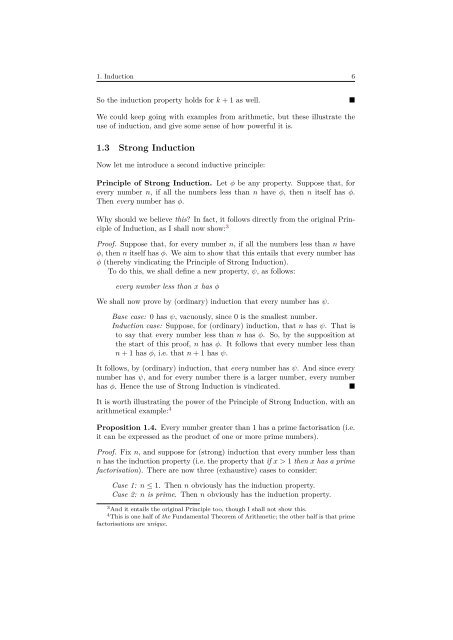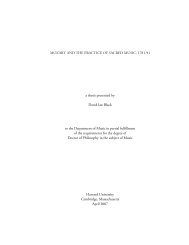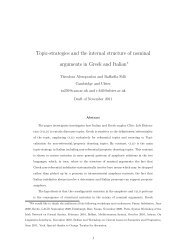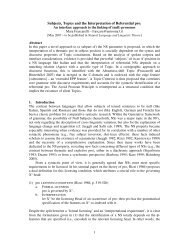Metatheory - University of Cambridge
Metatheory - University of Cambridge
Metatheory - University of Cambridge
You also want an ePaper? Increase the reach of your titles
YUMPU automatically turns print PDFs into web optimized ePapers that Google loves.
1. Induction 6<br />
So the induction property holds for k + 1 as well.<br />
■<br />
We could keep going with examples from arithmetic, but these illustrate the<br />
use <strong>of</strong> induction, and give some sense <strong>of</strong> how powerful it is.<br />
1.3 Strong Induction<br />
Now let me introduce a second inductive principle:<br />
Principle <strong>of</strong> Strong Induction. Let ϕ be any property. Suppose that, for<br />
every number n, if all the numbers less than n have ϕ, then n itself has ϕ.<br />
Then every number has ϕ.<br />
Why should we believe this? In fact, it follows directly from the original Principle<br />
<strong>of</strong> Induction, as I shall now show: 3<br />
Pro<strong>of</strong>. Suppose that, for every number n, if all the numbers less than n have<br />
ϕ, then n itself has ϕ. We aim to show that this entails that every number has<br />
ϕ (thereby vindicating the Principle <strong>of</strong> Strong Induction).<br />
To do this, we shall define a new property, ψ, as follows:<br />
every number less than x has ϕ<br />
We shall now prove by (ordinary) induction that every number has ψ.<br />
Base case: 0 has ψ, vacuously, since 0 is the smallest number.<br />
Induction case: Suppose, for (ordinary) induction, that n has ψ. That is<br />
to say that every number less than n has ϕ. So, by the supposition at<br />
the start <strong>of</strong> this pro<strong>of</strong>, n has ϕ. It follows that every number less than<br />
n + 1 has ϕ, i.e. that n + 1 has ψ.<br />
It follows, by (ordinary) induction, that every number has ψ. And since every<br />
number has ψ, and for every number there is a larger number, every number<br />
has ϕ. Hence the use <strong>of</strong> Strong Induction is vindicated.<br />
■<br />
It is worth illustrating the power <strong>of</strong> the Principle <strong>of</strong> Strong Induction, with an<br />
arithmetical example: 4<br />
Proposition 1.4. Every number greater than 1 has a prime factorisation (i.e.<br />
it can be expressed as the product <strong>of</strong> one or more prime numbers).<br />
Pro<strong>of</strong>. Fix n, and suppose for (strong) induction that every number less than<br />
n has the induction property (i.e. the property that if x > 1 then x has a prime<br />
factorisation). There are now three (exhaustive) cases to consider:<br />
Case 1: n ≤ 1. Then n obviously has the induction property.<br />
Case 2: n is prime. Then n obviously has the induction property.<br />
3 And it entails the original Principle too, though I shall not show this.<br />
4 This is one half <strong>of</strong> the Fundamental Theorem <strong>of</strong> Arithmetic; the other half is that prime<br />
factorisations are unique.
















